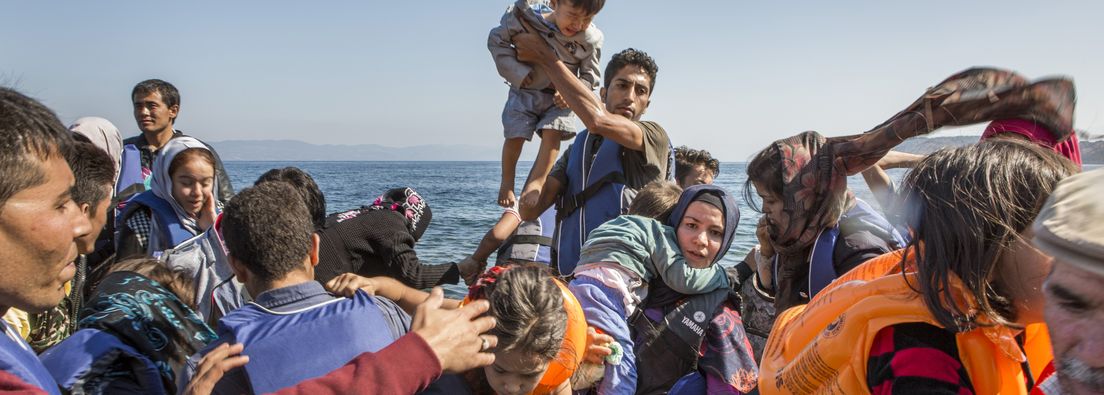People with no access to safe drinking water or toilets are exposed to bacteria and viruses putting them at risk of contracting diseases like cholera and Ebola. If not controlled, epidemics spread and humanitarian crises develop. Global water consumption and the lack of awareness for this valuable resource are problems which are exacerbated by climate change. Crises and natural disasters affecting thousands of people are likely to increase in the future, which will lead to more migration and forced displacement. Estimates suggest that by 2030 between 25 million and 1.8 billion people will be displaced due to natural disasters like flooding and extreme drought (source UNHCR).
The precariousness of water has serious consequences for refugees
Today, more than 2.1 billion people, which is more than a quarter of the world's population, lack access to safe drinking water; and more than half – 4.5 billion – do not have access to appropriate sanitary facilities. While water-related problems affect the world population, refugees and internally displaced people (IDPs) are particularly hit hard, and access to safe drinking water and sanitary facilities has become a daily challenge for many of them. They are often forced to take water from unclean sources and defecate in the open, which can lead to a number of other problems, especially in overpopulated refugee camps. Due to the high population density and poor hygiene conditions in these camps, diseases spread quickly and affect thousands of people.
Sparse water supply can also be the source of tension and conflict and pose a health hazard. Moreover, water shortages are one of the main reasons for children to leave school early, particularly young girls. It is often the women and girls who fetch water for the family exposing them to a myriad of dangers both for their health and safety, including sexual and gender-based violence. Water shortages are a major cause of vulnerability and destabilisation for any population as well as a large obstacle to their well-being.
International Engagement
The international commitment to ensure access to sustainably managed water supplies and sanitation facilities is laid down in the 2030 Agenda and its 17 Sustainable Development Goals (SDGs). Apart from governments all over the world, key multilateral actors such as the Office of the United Nations High Commissioner for Refugees (UNHCR), the International Red Cross and Red Crescent Movement, UNICEF and many non-governmental organisations (NGOs) work together to meet these goals.
Providing access to water as well as hygiene and sanitation facilities is one of UNHCR's key operational activities. The realisation of this basic human rights does in fact fall under the organisation's international protection mandate for refugees and the definition of durable solutions for forcibly displaced people.
During the initial phase of an emergency when thousands of displaced people arrive at the camps at the same time, temporary solutions like water tanks and chemical toilets are often necessary. In the long term and wherever possible, sustainable solutions such as setting up centralised water-distribution systems or suitable wastewater treatment practices are needed. These technical measures are complemented by basic hygiene programmes to educate and raise awareness among the people.
Switzerland's expertise in this field has been put to use in a number of humanitarian crises, such as in Cox's Bazaar in Bangladesh, currently home to the world's largest refugee camp (more than 900,000 refugees at the end of 2018). In order to reduce the high risk of an epidemic spreading in these overcrowded camps, Switzerland has set up and supported projects to improve the water supply and provide education to the refugees. The projects mainly focus on constructing emergency latrines and organising workshops for children and adults to raise awareness of the importance of hygiene as well as simple things such as handwashing practices. In special meetings, girls and women receive menstrual hygiene products and are given the opportunity to discuss menstrual hygiene and how to combat stereotypes about women being 'dirty and impure' during their periods.
Click on the links to find out more about UNHCR's work on access to water and Switzerland's engagement in water, sanitation and hygiene (WASH).
Awareness-raising workshop in St Gallen
In May 2019, 13 school classes with pupils aged between 10 and 16 took part in a special WASH workshop facilitated by three experts from the Swiss Humanitarian Aid Unit. The pupils, who were already very aware of the impact of climate change, talked about water-related problems in refugee camps with the experts, whose field experiences sparked a keen interest in their young audience. The pupils made the most of the workshop by asking the experts a number of questions.
During a hands-on exercise, they tested the St Gallen water supply by using the same materials as the Swiss Agency for Development and Cooperation (SDC) deploys on its missions. With ultraviolet lamps, for example, they learned more about their own personal hygiene and the importance of proper handwashing. They were also able to test their strength by carrying several litres of water on their heads for some metres, just like many women and children do all over the world. Far away from the public swimming pools, the pupils used chlorine and special filtration systems to improve the water quality and discuss issues such as water supply and wastewater disposal.
This playful workshop was an excellent way of raising awareness among the pupils and improving their understanding of the complex issues related to water and refugees. The three experts shared the St Gallen pupils’ enthusiasm for the workshop and were happy that they could satisfy their curiosity.


